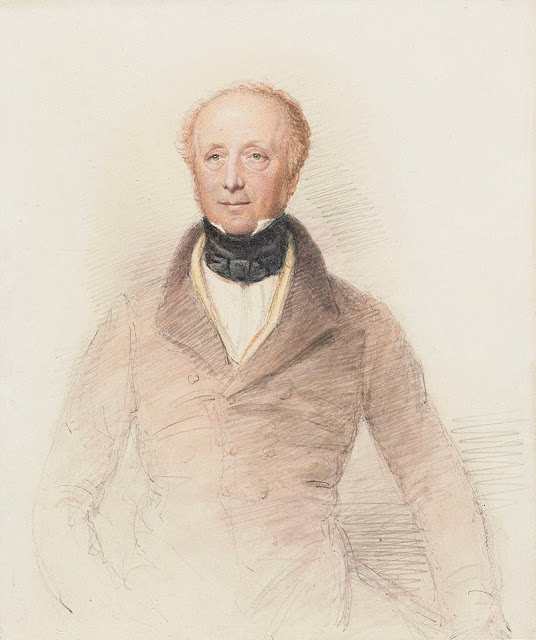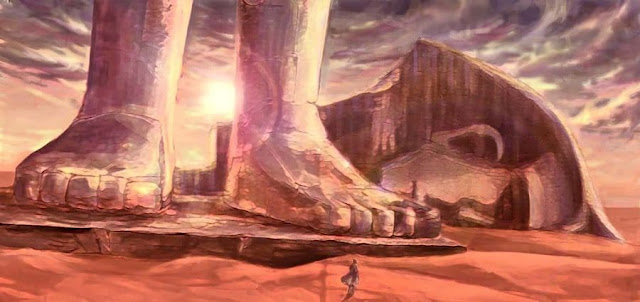-----oOo-----
Ozymandias
Quite some years ago I posted Shelley’s poem Ozymandias, but without comment.
The background is just as fascinating so here is the poem again, with comments . . .
--------oOo--------
Some facts and trivia . . .
Ozymandias is a sonnet written by the English Romantic poet Percy Bysshe Shelley (1792–1822).
Portrait of Shelley, by Alfred Clint (1829)
It was first published in the 11 January 1818 issue of The Examiner of London. The poem was included the following year in Shelley's collection Rosalind and Helen, A Modern Eclogue; with Other Poems, and in a posthumous compilation of his poems published in 1826.
Shelley wrote the poem in friendly competition with his friend and fellow poet Horace Smith (1779–1849), who also wrote a sonnet on the same topic with the same title.
Portrait of Horace Smith by an unknown artist watercolour, circa 1840
At this time, members of the Shelleys' literary circle would sometimes challenge each other to write competing sonnets on a common subject: Shelley, John Keats and Leigh Hunt wrote competing sonnets about the Nile around the same time.
Shelley and Smith both chose a passage from the writings of the Greek historian Diodorus Siculus in Bibliotheca Historica, which described a massive Egyptian statue and quoted its inscription: "King of Kings Ozymandias am I. If any want to know how great I am and where I lie, let him outdo me in my work." In Shelley's poem, Diodorus becomes "a traveller from an antique land."
The poem explores the fate of history and the ravages of time: even the greatest men and the empires they forge are impermanent, their legacies fated to decay into oblivion.
The main message of Shelley’s Ozymandias is that political power is not destined to last. It is temporal, not eternal, no matter how powerful or fearsome a particular ruler may be. Even the most ruthless dictators will one day die, and what they regarded as their eternal achievements will also eventually pass on.
The irony in the poem lies in the fact that the following words are engraved on the statue - “My name is Ozymandias, king of kings; Look upon my works ye Mighty and despair!” - yet now all that remains in the desert are huge legs and broken face, trunkless, without a body.
In antiquity, Ozymandias was a Greek name for the pharaoh Ramesses II (1279–1213 BC).
Shelley began writing the poem Ozymandias, after the British Museum acquired a head-and-torso fragment of a statue of Ramesses II, which dated from the 13th century BC.
The statue fragment of Ramesses II in the British Museum.
Does it remind anyone of the final scene in the original Planet of the Apes? . . .
-----oOo-----
Shelley’s poem:
Ozymandias
I met a traveller from an antique land
Who said: "Two vast and trunkless legs of stone
Stand in the desert. Near them, on the sand,
Half sunk, a shattered visage lies, whose frown,
And wrinkled lip, and sneer of cold command,
Tell that its sculptor well those passions read
Which yet survive, stamped on these lifeless things,
The hand that mocked them and the heart that fed:
And on the pedestal these words appear:
"My name is Ozymandias, king of kings;
Look on my works, ye Mighty, and despair!"
Nothing beside remains. Round the decay
Of that colossal wreck, boundless and bare
The lone and level sands stretch far away."
-----oOo-----
Smith’s poem:
Ozymandias
In Egypt's sandy silence, all alone,
Stands a gigantic Leg, which far off throws
The only shadow that the Desert knows:—
"I am great OZYMANDIAS," saith the stone,
"The King of Kings; this mighty City shows
The wonders of my hand."— The City's gone,—
Naught but the Leg remaining to disclose
The site of this forgotten Babylon.
We wonder,—and some Hunter may express
Wonder like ours, when thro' the wilderness
Where London stood, holding the Wolf in chace,
He meets some fragment huge, and stops to guess
What powerful but unrecorded race
Once dwelt in that annihilated place.
-----oOo-----
I know which one I prefer.
-----oOo-----
George Harrison said it simpler:
All things must pass away







No comments:
Post a Comment
Note: Only a member of this blog may post a comment.